NOTE: This project log was originally posted on 08/30/2023 at 23:11 EDT, but due to a misunderstanding, it had to be deleted and remade.
My work on the Open Book spans a whole four years now, from the first idle thoughts of “We should have a DIY e-book” to now, when I think we have a prototype that’s worthy of that claim.
In between then and now, I’ve put three versions of the book forward, not counting the fourth one that I’m submitting here for the Hackaday Prize. Each of these concepts represents a refinement of the idea, from a FeatherWing accessory board, to a standalone object that was hard to build, to a standalone object that was easier to build.
Still, even as I put these versions of the book forward, I never actually put them forward as fully assembled objects. I put them forward as an open source hardware project, with full schematics, Gerbers and BOMs. Sometimes I sold boards or parts; in other cases I even led workshops. But the premise of the Open Book was always this: you participated in making it.
Supercon 2022: Joey’s Ad-Hoc Build-a-Book Workshop
Late last year, when the Abridged Edition design was trending toward done, I decided to bring some of the kits along to my first Hackaday Supercon. I didn’t really have a plan for them, other than to say that I was hoping that they wouldn’t come home with me. The kits, at this point, consisted of a printed circuit board, a display, and a little castellated e-paper driver module (plus a whole mess of cut tape strips in my canvas Hackaday bag).
This wasn’t an official workshop. It didn’t appear on the schedule, because I didn’t even know that I was going to do it until I got to Supercon. But while hanging out with some friends and colleagues that Friday, the conversation just drifted there: “Do y’all want to build a book? Let’s do it.”
“Let’s do it now.”
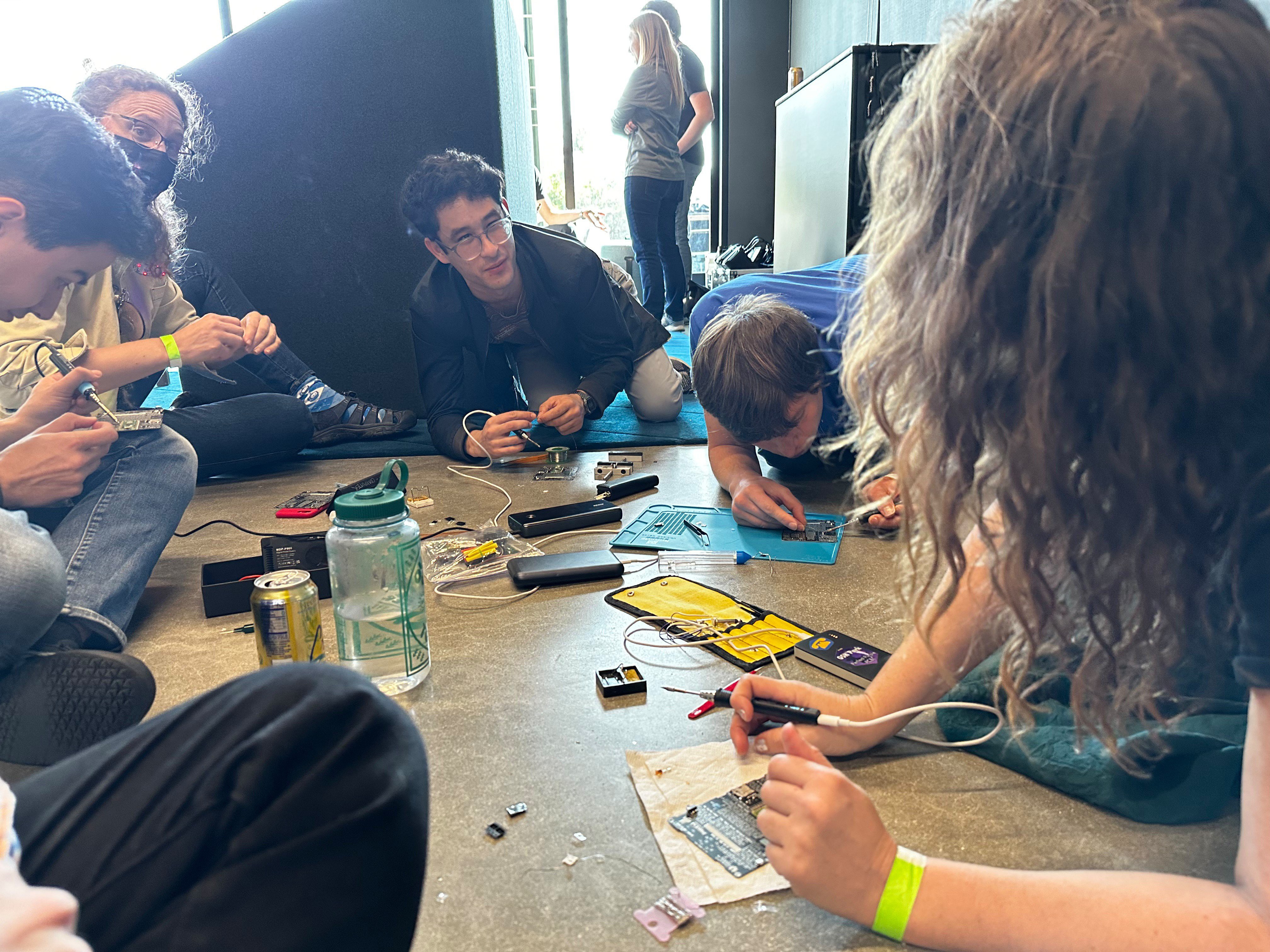
So, there, on the floor of Supplyframe HQ, armed with whatever Pinecils and battery packs we had on hand, a dozen folks started soldering. Not everyone in the group had surface mount soldering experience; at least one worried that they wouldn’t be able to build it. The BOM wasn’t kitted at all; rather, the instructions I'd printed on the circuit board said to solder parts in order, and I ran around like the parts fairy — “Anyone need a 10K resistor? Who needs MOSFETS?”
The hour was a chaotic scene, but by the end of it, all the books were assembled. We discovered that a couple of folks’ devices didn’t work completely. But I helped some members of the group, and other members of the group helped each other. By the end, with just a bit of rework, 100% of the people on that floor walked away with their very own working Open Book.
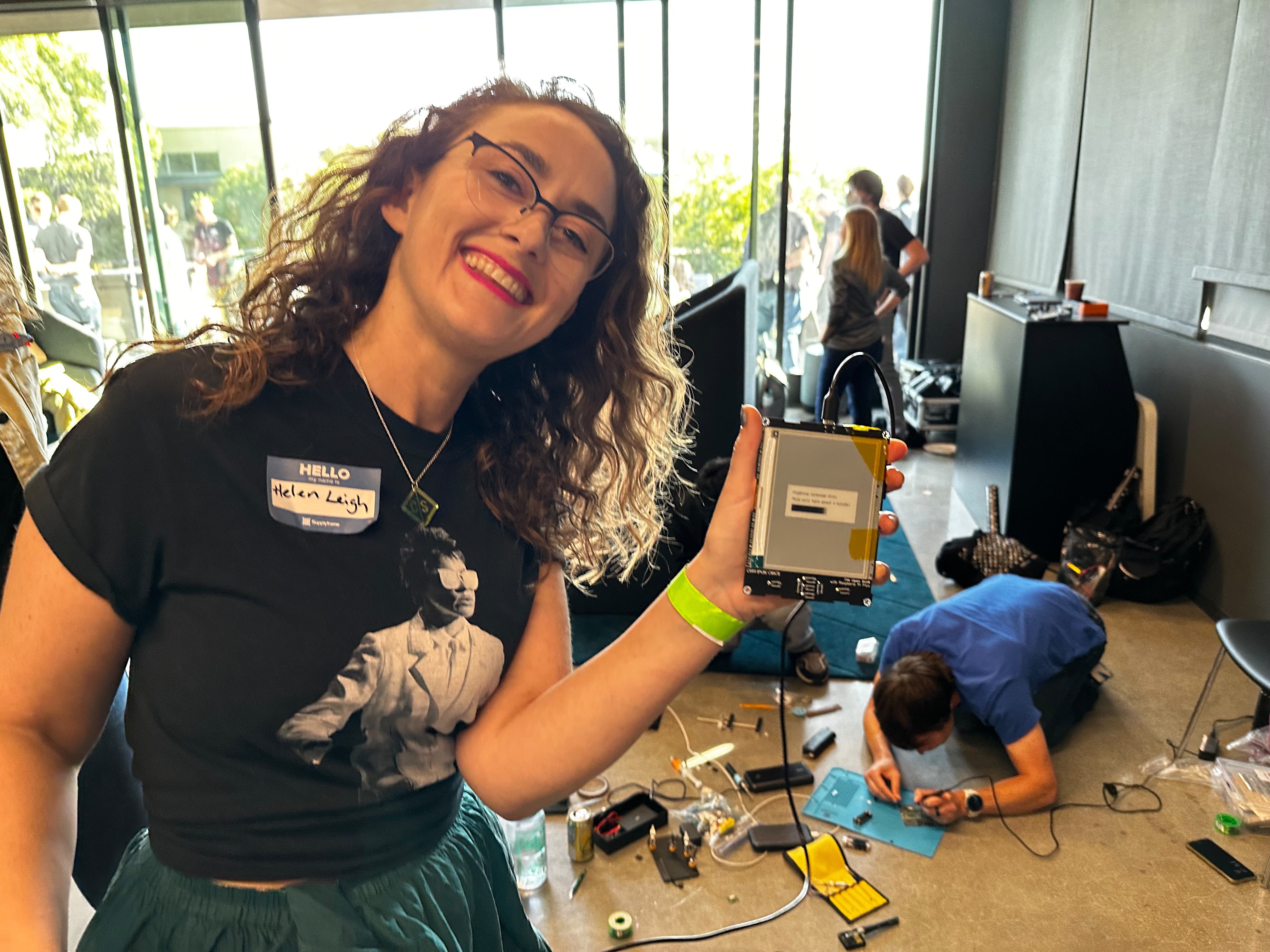
The experience of running that ad-hoc workshop taught me a couple of things. For one thing, I learned that this version of the design was in fact something that folks could DIY. Of course it also helped me to recognize that I couldn’t be everyone’s personal parts fairy; to make this thing make more sense, I would have to get organized.
A short phase two: selling kits
After the workshop, I gathered what remaining parts I had on hand, and I assembled a few kits. The Open Book Abridged Edition Kit is essentially the same design as the one in the workshop, but with a component card to keep the parts organized, and with a lot of very carefully placed bubble wrap (not pictured) to protect it when I sent it out, in the mail, to folks who ordered it on the Oddly Specific Shop.
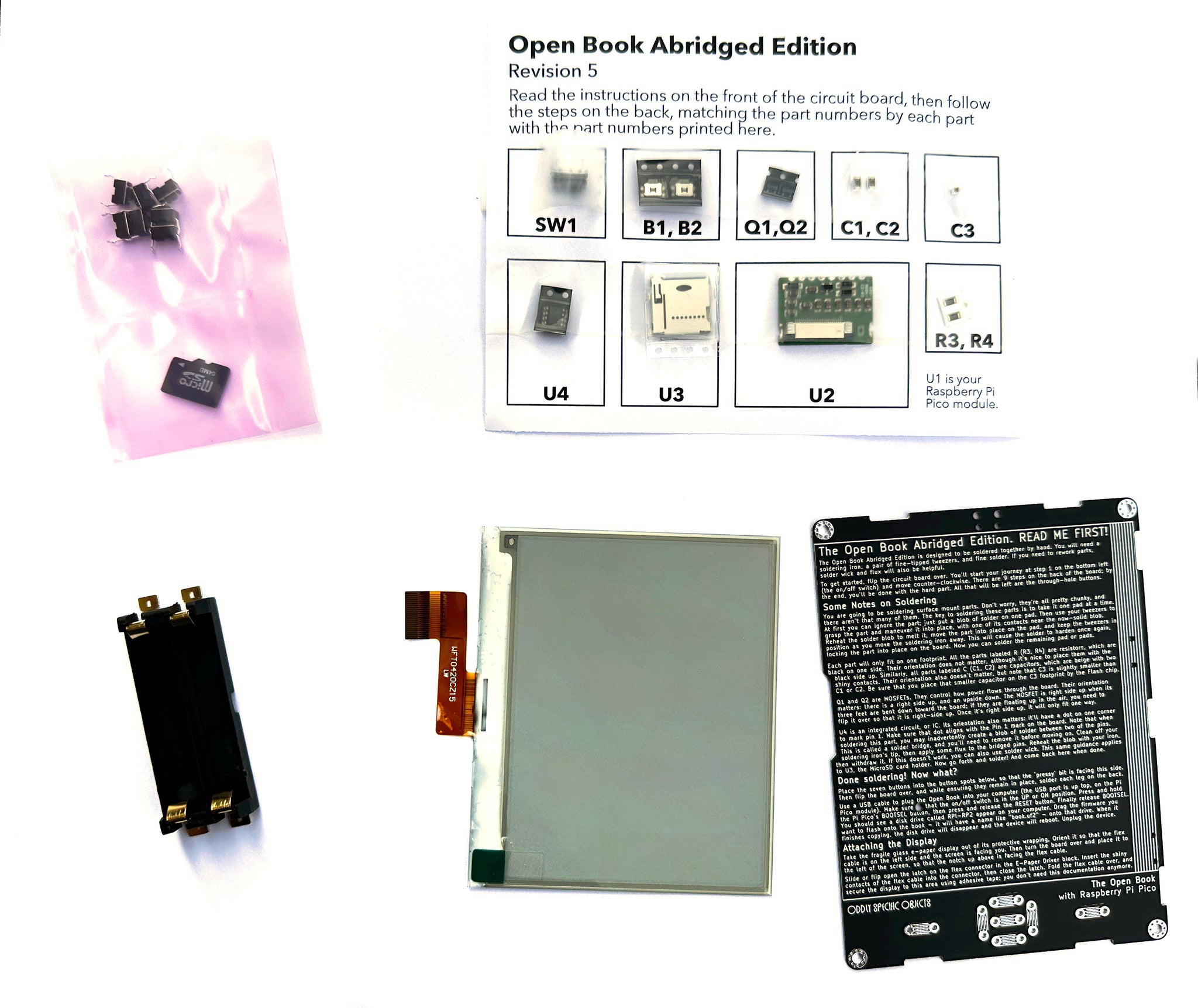
Here’s the truth though: I never sold that many kits. They were time consuming to put together, and it was really hard to keep them in stock; I’d order ten sets of parts, make ten kits, and then use the proceeds from those ten kits to buy parts for the next ten. I found myself treading water, never quite operating at the volume that I needed to really churn these objects out.
But in the end, it didn’t really matter. Because when you open source hardware, suddenly you’re not the only one doing the work.
You’ll Never Make IT On Your Own
For most of 2023, I was out of stock of these kits. Lacking the time and the cash flow for Open Book stuff, I focused on other projects, like Sensor Watch and various LCD oriented gadgets. But then a funny thing happened. In some ways, it echoed what happened at the workshop, when members of the group helped each other rework their boards.
The community started working together.
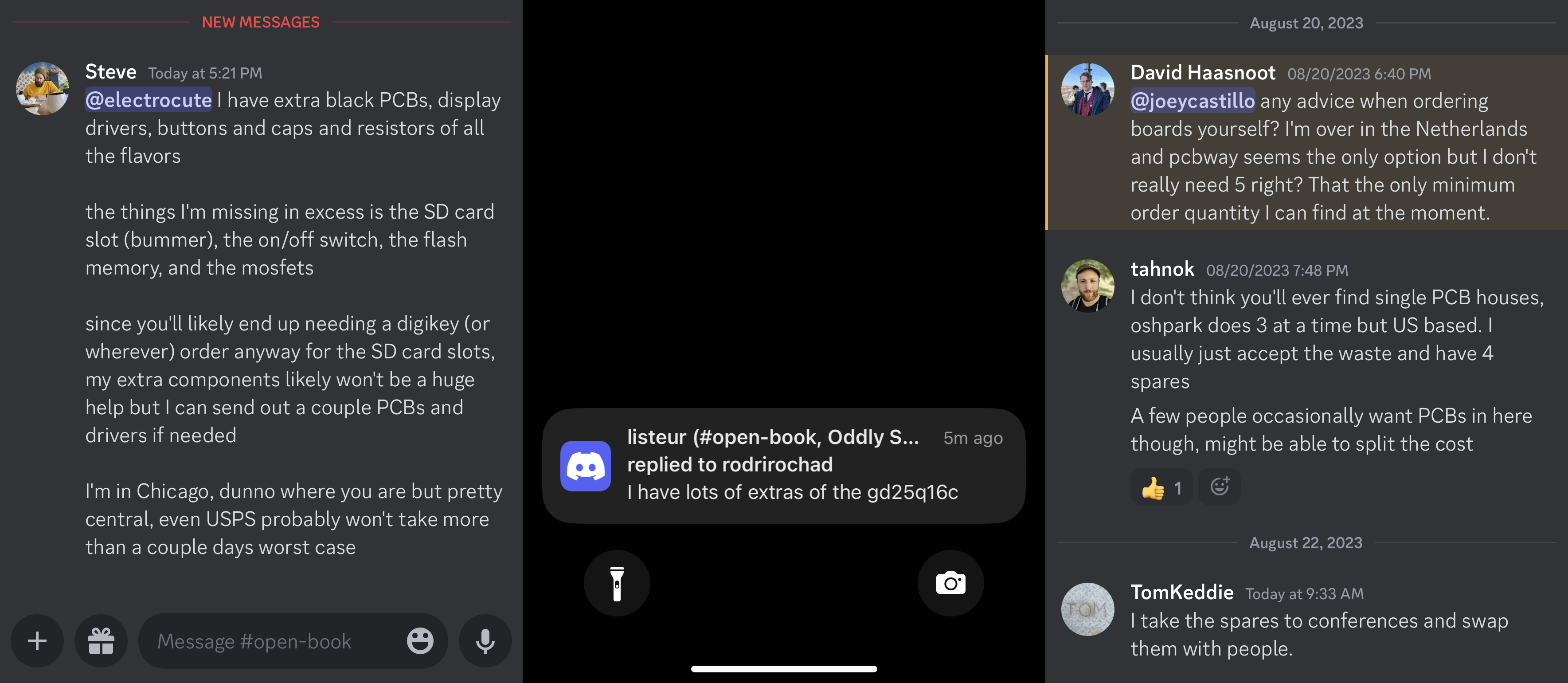
Empowered by the open source schematics and board design files, the shared STL’s and OpenSCAD scripts, folks started gathering the parts for the kits themselves, some placing not just their first ever PCB order for the Open Book boards, but their first PCBA order, to get the e-paper drivers built and assembled at quantities of five — and sharing the extras.
Over the course of the year, I’ve seen Open Book builds in colors of PCB that I’ve never ordered. Case designs that I'd never considered. And perhaps most impressive of all, software features that I never coded.
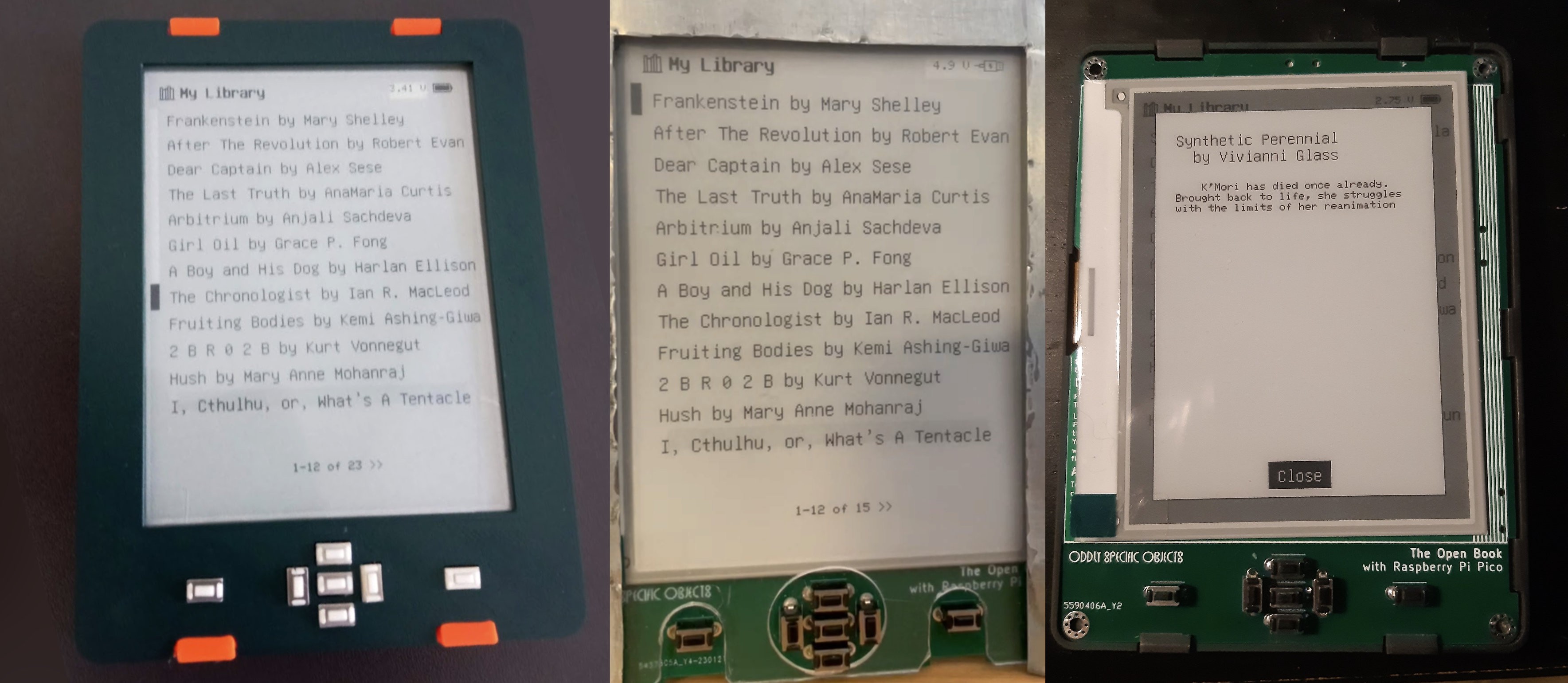
These are three Open Books, all built by members of the community using PCBs from at least two separate orders that I didn’t place, in cases that I didn’t fabricate (or in one case, even design). They’re all running a forked version of Libros, the open source firmware for the Open Book, that Steve (nvts8a) has been working on. He’s added pagination to the main menu, along with a nice looking book information card. He’s refactored the book database, enhanced the UI, and improved the speed of the pagination by an order of magnitude.
Like, he’s 40 releases in. Seriously.
Anyway, the title of this post is this phrase that keeps coming to mind when trying to make open source hardware. It’s not to say you’ll NEVER make it on your own, like there’s this insurmountable wall between you and me and making a thing. Clearly things get made. It’s also not to say YOU’LL never make it on your own, like there’s some personal thing stopping you. I don’t think any of us can make it on our own.
The point of the phrase is you’ll never make IT on your own. It, the thing you’re making. Working on our projects alone in basements and garages, without a ton of resources or free time, it’s true: making a thing is hard. But if you truly let the idea out into the world, if you document it well and give the community a chance to take ownership of it?
They’ll take it to places you never knew possible.
If the premise of the Open Book was that you participated in making it, its course over the last four years has shown me, in ways I didn’t anticipate, just how deep a seed like that could take root.
 joey castillo
joey castillo
Discussions
Become a Hackaday.io Member
Create an account to leave a comment. Already have an account? Log In.
Your dedication to the Open Book project is truly commendable. The way you've steered it through a four-year journey, fostering community collaboration and embracing the principles of open source, is both inspiring and impactful. Your commitment to sharing knowledge and creating a space for collective innovation has not only resulted in a remarkable project but has also sparked creativity within the community. Kudos to your leadership and the positive influence you've had on the collaborative spirit of open source hardware. https://reelssaver.net/
Are you sure? yes | no